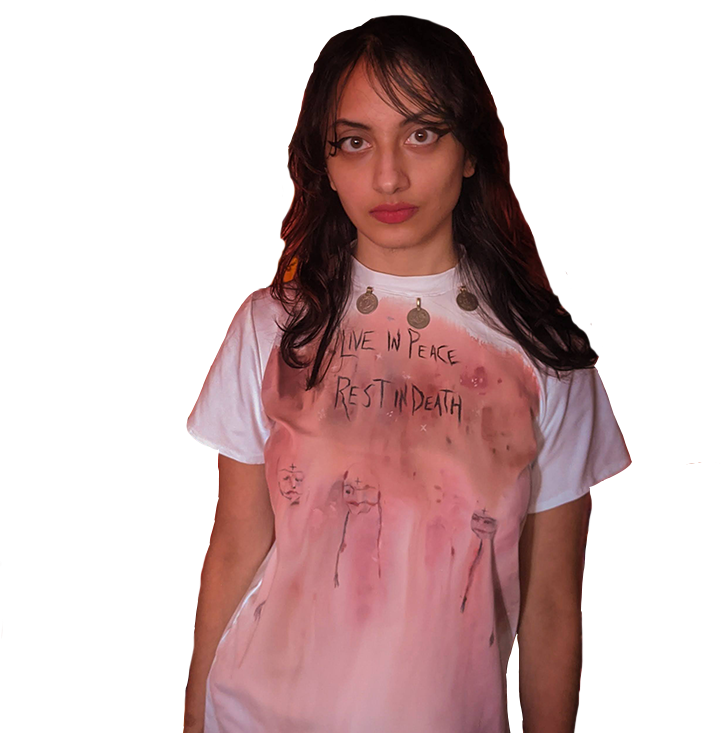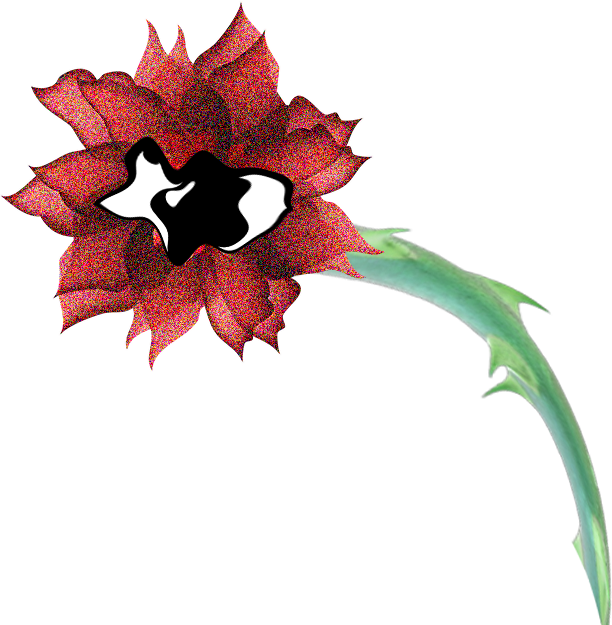

I THINK ABOUT where I belong in the world a lot. I was born and raised in New York. My parents are Afghan and they're immigrants and the way that I've grown up has been just so Afghan in a lot of ways, but being in New York, the way I’ve grown up has been so New York as well. I think of myself as more of a New Yorker than an American.
she/her
Editor's Note: This interview
was recorded in Feb 2021, and the flashing ghosts featured above are adopted from Shiraz's body of work

> Growing up, I absorbed so much from my parents in terms of religion and culture without thinking about it, which I guess is what every kid does.
But as I've looked back over the years, I think they've had a lot of trauma from having to leave Afghanistan and having to live in this totally new country as adults. My dad moved from Kabul to Moscow when he was 18 to go to school, back when it was more peaceful in the country. And then once the fighting between the Soviet Union and Afghanistan started, he had to leave right after graduating and just find a way to any country. And his last choice was the US. But that was, in the end, the only country that accepted him. Once he was here, my dad says that his sister sent him photos of my mom as a potential wife. He was choosing between a couple of people and he had a dream…a vision…of my mom saying, come to Afghanistan. And so he went! In 1992, I think. That was when the Taliban were in power. And so he had this whole crazy journey there with her. And that’s the first time she even left the city, let alone the country.
I feel like they've drilled that story into me so many times that it's just always had this impact on the way that I think about my place in the US and what I'm doing here. It feels like there's a lot of pressure to do really well now that I'm here, and also having to be grateful for it. So it gets really complicated when I criticize the US, because that's actually something that they're really touchy about. I try not to bring it up too much around them (heavy emphasis on the "try") because they're so grateful to even be here.
Also the types of worries that they now have, it just shows me what exactly they've experienced in their past. For example, I have two sisters and my parents are constantly drilling it into our heads…that we can’t leave the family, we can't have fights with each other that will then break the family apart. And I think that’s because separating from their own families is a big thing for them. They both have not really had any contact with their own families because they live in either Afghanistan or some other places in Europe.


I think as a super young kid, my Afghanness was just a given. I always think of childhood as the purest time. I just remember…the carpets that we have and the music my mom would make us dance to, and the traditional Afghan clothes that we have at home, all of that made me feel so special as a kid. I remember we would have some family friends who are Afghan and just being around them, I felt really secure. It wasn’t until middle school that I started to feel like, I am Afghan and these people are not Afghan. I think that's when I was trying to reject my Afghan identity rather than embrace it. Around then, I remember trying so hard to be like these other white people. Still, I never hid the fact that I’m Afghan, other than one time because my dad was telling me to tell people I was from Russia.
> I think he was trying to protect me from discrimination and bigotry and stuff like that, but all it did was confuse me even more.
THINGS CHANGED IN HIGH SCHOOL and I started trying to be this subversive punk teenager, who could always back it up with my Afghanness and being anti-military and stuff like that. Since then, I don’t feel like my relationship with it has been completely consistent. There are definitely times when I’m trying to learn as much as I can, and make my Farsi better, and just engage with it consciously. And then there are other times where I feel like I need a break from thinking about Afghanistan for a while, even if I can never truly forget about it. And I guess that's that is kind of a privilege as well, to be honest. I think it was after I moved back home after college, after those four years, I felt the emptiness and lack of an Afghan community. So even if the community was literally just my other family members, I really embraced it, and said, yes, I need to get better knowing the language and what’s going on in Afghanistan. I also started to meet other Afghans. My family had kind of painted this picture of Afghans in the US being super conservative. But eventually through Instagram, I started to find all these other Afghans who are just badass, anti-colonialist types of people, and it just feels so good to talk with them.
I DEFINITELY HAVE FAITH in a higher being or God. I mean, I still call myself a Muslim, and I think about religion and God a lot. I think it's really influenced by how my dad believes in God. He's always talking about how God is the most forgiving. He has this very kind of perception of God. I don’t think all religious people paint God in that way, and even some other family members have a more harsh perception. I was agnostic throughout high school, but I feel like once I was away from my family during college, I started to really appreciate being brought up with some sort of faith and spirituality. I feel like being around people who aren't Muslim kind of made me feel more Muslim in a way.
I THINK IN TERMS of being an immigrant child and stuff like that, I really do believe in this idea of generational trauma and inheriting that from your family and really having to work through it yourself. And I feel like for me, a lot of it comes out in my artwork because a lot of it also deals with this crisis of identity and trying to figure out where you belong in American society or culture. I also feel like when I read about traditional kinds of Western American therapy or even talk to therapists, it's really hard to make them understand the cultural elements of my life or find resources that specifically address these elements.
> I am an Afghan person, and I feel like anything I make is just Afghan art.
Even if it's just a painting of the landscape in New York or something, it would still be art by an Afghan person. I view art as something that really does have your identity embedded within it, you just can't separate your identity from what you're making. I don't think that means you should only relegate myself or other Afghan artists to galleries specific to let's say like South Asian artists. And that's kind of all the representation we get. I don't like that either. But I think that within the past few years, I’m making my art about my identity and acknowledging the ways in which my experiences have impacted the way that I make art.



SHIRAZ FAZLI (she/her) is an interdisciplinary artist born and based in Brooklyn, New York. In drawings, paintings, and videos, she visualizes the ghosts of the past and the undefined location of those who wander. In doing so, she finds inspiration in the constantly changing landscape of time. Her menacing figures entangle with each other as they overlap, collide, and multiply over abstract spaces, demonstrating humanity’s inherent interconnectivity through the chaos. You can explore her work here.
> But in reality, they just know what they've seen on TV and maybe what their family is telling them. So that just isn't a big enough information pool.
I used to be so into trying to find galleries or shows I could show at, but it just really is not that fulfilling to me, to be honest. Instead, I like putting art on clothes, so people can really engage with it or I like working with the community. I think community is just such a big part of life of my artwork, like the Afghan Story Project for instance. I thought of it after I read about this atrocious show: United States of Al. [For context, it’s this show about an Afghan interpreter who comes to the US. There’s a American military veteran that's his best friend and they…I don't know… have fun together I guess.]
I just remember reading about it and learning more about it and feeling, I thought we are over this kind of weird ‘white person with their POC friend’ storyline. I was like, OK, there needs to be something different. And so I decided to collect stories of Afghans, and make art that's kind of inspired by their stories. Not showing exactly what they're describing, but just kind of interpreting the feelings and ideas of it, because I do like abstraction and the freedom that comes with it. And this project is first and foremost for the eyes and hearts of other Afghans rather than the Western white gaze.
I JUST WANT to educate so many people about Afghanistan and its people and the culture and the art. I just want to show Afghans and non-Afghans alike how this is a place that deserves to be kind of invested in and deserves to have some hope and isn't constantly this disputed territory. I want people to find the beauty in Afghanistan and also educate people just about the power of art itself. I think there are a lot of Afghans in the diaspora who seem sort of self-colonized almost. It feels like they've taken in so much from Western and American media and what they're saying about Afghanistan and how Americans portray it. And so they don't really engage critically with it because they think, oh, I'm Afghan, I know what's going on.


